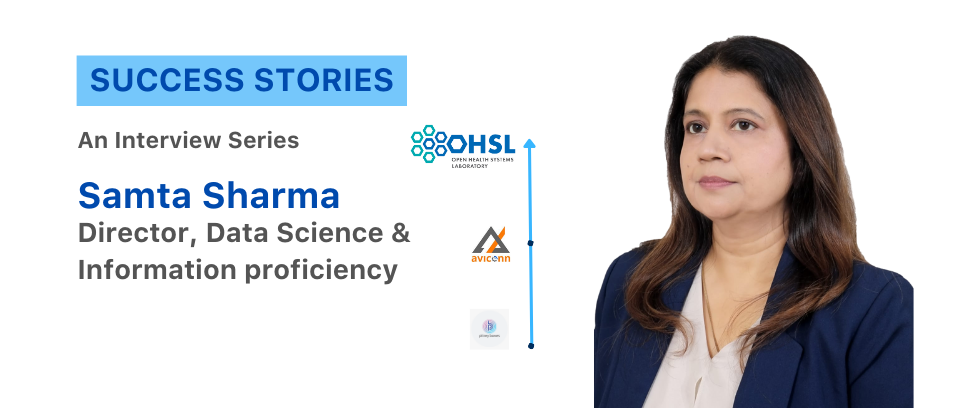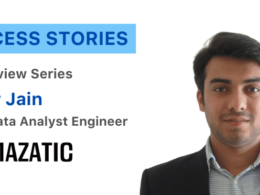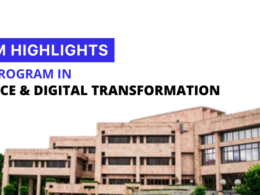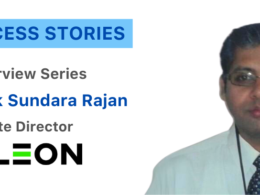In this episode of our Accredian Success Story series, we feature Samta Sharma, Director, Data Science & Information Proficiency, OHSL.
An engineer by profession, Samta has nearly 21 years of experience in development and project management. However, owing to her love for new technologies, she decided to explore the field of Data Science and build a career in the same.
She joined Accredian’s GCDAI program in the 2020 cohort and soon after completing her course, cracked a Data Science role. In this interview, she shares her career transition story, why she chose to move to Data Science from Product Management, the challenges she faced, and more.
Q1. Tell us about your current role and background
So I work as a Director, Data Science and Information Proficiency for Open Health Systems Laboratory, which is a global science consortium. It leverages the best biomedical informatics, computation engineering, communication technology, and data sciences. It supports scientific research directed at advancing the sciences, engineering, innovation. I also work as a consultant to other companies in my free time.
I am a Btech graduate and hold an executive MBA as well. I have been in the IT industry for the last 21 years. I started as a software engineer and then moved to product development/management roles in multiple organizations. I have worked with companies such as Tata Infotech, HP, and Pitney Bowes.
Q2. Why did you switch to Data Science after Project Management?
I see that project management was an easier transition for me, due to my many attributes, like I had the eye to detail, I was taking the team along, I have a habit of very clean closure, on-time delivery, and an engineering approach.
But as all of us do, I also got dissatisfied with monotony. So I needed more challenges. And this is where I decided to do MBA and get into the business world. Afterward, I found that I was happier to work in the technical domain.
So at the same time, my daughter was pursuing her BTech and studying new technologies. And that brought my attention to these new technologies and I got curious to learn artificial intelligence, machine learning, deep learning, data science, and more. So that’s how it started.
Q3. What was the transition process to Data Science?
First of all, one needs to know what do they want in the Data Science paradigm. I started with learning Python, as it was an easier first step as I had been a programmer. So, learning libraries and graphs was fun parallelly, as I said, my daughter was also learning. So we helped each other actually in this process.
Then there were many doubts regarding the subjects. There were so many new terms and jargon. So, I decided to learn systematically under a program. And then I started searching for a structured Data Science program.
Q4. Why Accredian? How did it help you?
In my initial research, I found that Accredian’s curriculum was designed in great detail. They had everything a Data Science enthusiast wants to know and needs to learn. During the course, we are taught statistics, mathematics, machine learning, and more.
Accredian faculty is very experienced. They belong to the industry, are Data Science practitioners, and are experienced in teaching as well. They explained the concepts in a very interesting and detailed way.
Accredian has an advanced method of post-delivery as well, which helped in this pandemic time. Apart from that assignments are given on regular basis, which helps to practice along the course.
Q5. What do you do exactly in your current role?
So I work with a few clients on data collection, understanding transformations, data analysis, and then modeling, and then presenting it back to them. And having lots of discussions with them. I have small teams to do these activities. In the biomedical informatics area, we are involved in research work with the auditor itself, they work with different scientists to understand their domain, their problem areas, and then we present the insights of data to them.
We do feature engineering, run predictive models, and also deploy them in some cases. We also suggest the features that can be helpful for the clients’ products and their customers. So it’s kind of really tedious and demanding work. But to me, it is very rewarding.
Q6. What advice would you give to Data Science beginners?
In my opinion, it is very helpful if you can learn in a structured way. You can even go by just YouTube videos or certificate courses and you will have enough understanding to create the solutions. Secondly, get involved in real-time projects. This is going to help a lot as it will make you understand that it is not just data modeling but there is also a lot to be done before and after it. Thank you.
If you found this interview interesting, let us know in the comments below. If you have any Data Science questions, fill this form, and we will get back to you.







1 comment